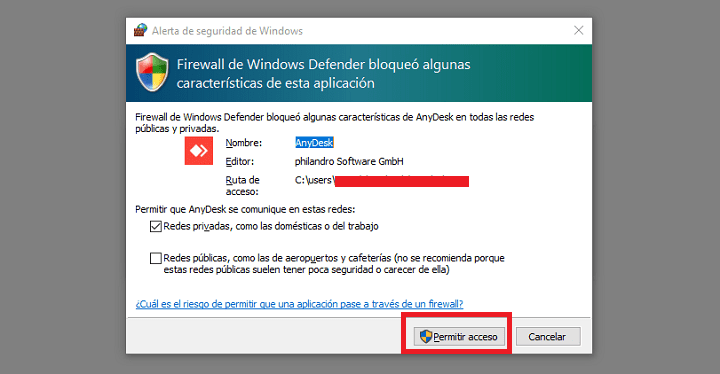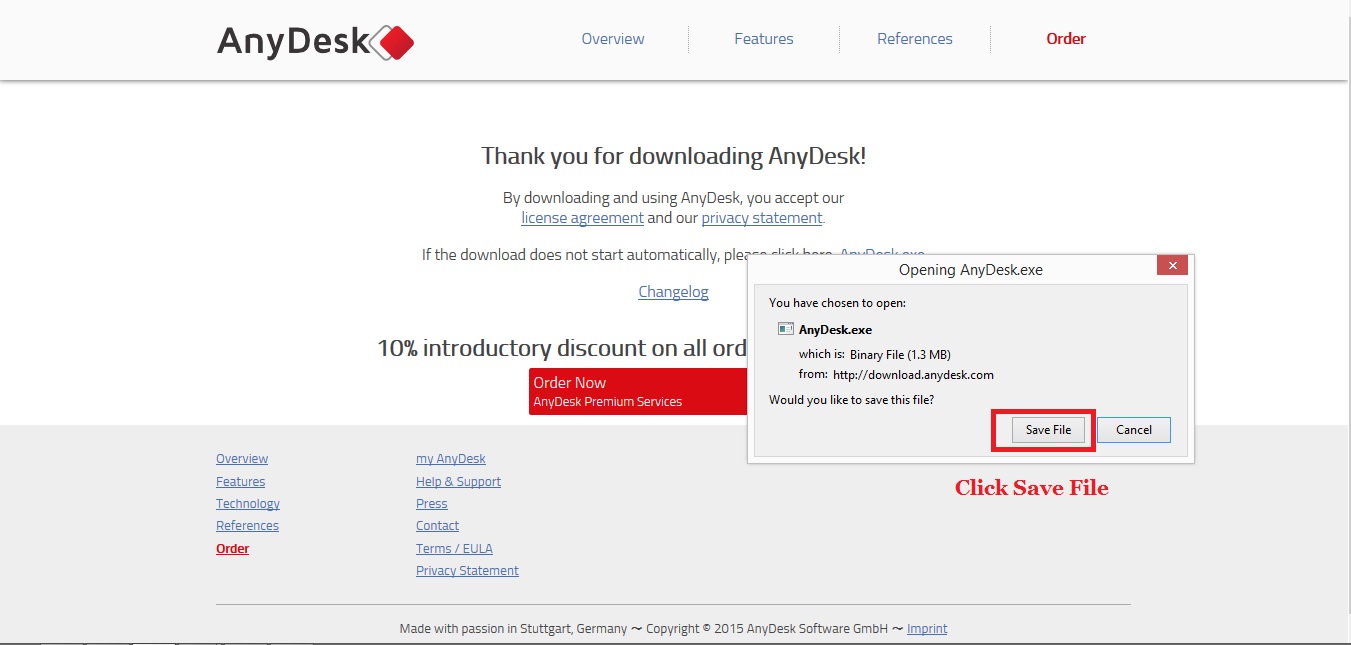DisplayName -like 'AnyDesk' Select DisplayName, Profile, Enabled DisplayName Profile Enabled - - - AnyDesk Private True AnyDesk Private True AnyDesk Domain True AnyDesk Domain True Windows Firewall Profile is applied based on the Network Connection Profile in Network and Sharing Center.

- AnyDesk is the world's most comfortable remote desktop application. Access all your programs, documents and files from anywher. This protocol is shared by another user.
- The page says that only IP 239.255.102.18 should be allowed for AnyDesk. But when I add it to my Firewall rule, I still see the orange warning that AnyDesk can't connect to its network and my AnyDesk address is 0. Which IP address (es) should I add to my rule to enable AnyDesk? Win 7 Home Premium.
- I have add anydesk in exceptions as per your suggestion After this when I try to connect anydesk it shows 'Could not connect to the anydesk network (ssl14090086)' Please help me out.
AnyDesk vs VNC
Today, we are going to compare AnyDesk vs VNC, two of the most well-known remote desktop software packages and alternatives for Microsoft’s Remote Desktop Connection.
So what is remote desktop software? It might have happened to you to need to access a distant computer, for example, to access your work computer from home, or to remotely fix your friend’s PC, etc. Remote desktop software is what enables you to do just that. Using a remote desktop tool, such as Remote Desktop Connection, TeamViewer, AnyDesk or VNC, any user with the right permissions can access and take over any remote computer over the Internet or the network.
As the first step, you need to decide which remote desktop tool fits best for your needs. So, let’s have a comparison of AnyDesk vs VNC.
History of AnyDesk vs VNC

AnyDesk is a rather young remote desktop tool, which was created by a German startup company called AnyDesk Software GmbH in 2015. Nevertheless, it has risen to popularity, very fast and now, is considered one of the top remote desktop tools, in the world.
Virtual Network Computing (VNC) is a veteran remote desktop tool that was created at the Olivetti Research Laboratory (ORL) in the late 1990s. The open-source tool uses the Remote Frame Buffer protocol (RFB) to share screens and control remote computers.
Anydesk Firewall Settings

The Olivetti Research Laboratory was closed just a few years after the release of VNC, but since VNC is open-source, many researchers have continued to work on the VNC project and released several improved variants of VNC. So much so that currently, many implementations of the VNC, including RealVNC, TightVNC, PocketVNC, TigerVNC, TurboVNC, and UltraVNC are available to use, with more features and better quality.
Cross-platform compatibility in AnyDesk vs VNC
AnyDesk is free for personal use but for business purposes, purchasing a license is required.
VNC is an open-source free remote desktop tool. Several other forks of VNC, such as UltraVNC and TightVNC are free, too, but some VNC variants are not.
On several operating systems such as Windows, macOS, Linux, and FreeBSD, AnyDesk is available to use As client and server, both. For some other platforms like Android, iOS, Raspberry Pi and Chrome OS, AnyDesk can only be used for the client system.
As for the VNC, its protocol, RFB, is basically designed to be independent of the platform. So, it makes VNC one of the most cross-platform compatible remote desktop tools, ever. Furthermore, there are several modern forks of VNC available out there, which cover almost any platform, including Java.
Security in AnyDesk vs VNC
AnyDesk uses TLS1.2 with AEAD (authenticated encryption with associated data) to secure all sessions and prevent unauthorized access. It also exploits RSA 2048 asymmetric key exchange encryption to verify all connections. Moreover, AnyDesk gives users an option to define a whitelist called Access Control List, to prevent unknown and untrusted systems from ever connecting to their computers. By enabling this feature, session requests from anyone who is not on the whitelist are blocked, automatically.
But still, none of these have completely stopped online fraudsters and hackers from misusing this popular remote desktop tool. For example in 2018, Japanese cybersecurity and defense company firm Trend Micro announced that they had detected a new ransomware strain called BlackHeart, which contained two components: a legitimate AnyDesk application and an infectious part. The BlackHeart ransomware was probably downloaded from malicious sites and as soon as it reached a target, it ran both files on the victim’s computer. Since, unlike previous ransomware using remote desktop tools, BlackHeart did not use AnyDesk for propagation, Trend Micro suggested bundling the two files together was very likely a means to evade detection, so the BlackHeart was able to hide its actual purpose while encrypting the victim’s files.
Anydesk Firewall Ubuntu
In another security incident, in early 2019, the Reserve Bank of India warned that AnyDesk was being used by online scammers to steal bank accounts information.
As for the VNC, the original implementation is very insecure. But over the years, developers of some modern VNC forks tried to add security measures to make their products more practical in the age of hackers. For instance, VNC Connect by RealVNC uses AES-GCM encryption to secure the data while traveling between systems. 128-bit AES encryption is supported in all different tiers of VNC Connect, plus, with an Enterprise license, you have the option to increase your security with 256-bit AES encryption. Red alert 3 keygen serial generator free. All data is encrypted end-to-end, therefore, no one, not even the RealVNC servers, can read it, in the way to its destination. Besides, VNC Connect supports filtering by IP and as an additional security measure, it provides inactivity timeout.
But still, the modern VNC forks are by no means unfamiliar with security issues. For instance, in 2019, tests performed by Kaspersky's Industrial Systems Emergency Response Team (ICS CERT) on four popular open-source implementations of VNC, exposed 37 security problems, which included 22 vulnerabilities in UltraVNC, 10 in LibVNC, 4 in TightVNC, and one in TurboVNC.
It’s worth mentioning that Kaspersky researchers were not able to analyze RealVNC, as its license does not permit reverse engineering.
Considering all the security issues around the remote desktop tools, it is vital not to just rely on the developers of these apps for preserving your security. There are very simple but important steps that can save your system from risks such as Brute Force Attacks.
Features and properties of AnyDesk vs VNC
Comparing the features and options of VNC vs AnyDesk is not very simple, because, although the main VNC software is a rather simple tool with few abilities, nowadays, several VNC forks with many different capabilities and features exist. So, in addition to comparing AnyDesk vs VNC, you may want to also compare AnyDesk vs VNC forks. With that in mind, let’s compare some features in AnyDesk and VNC.
- AnyDesk is believed to be faster and more efficient than VNC, due to VNC’s old and simple protocol. Then again, new versions of RFB have seen much improvement.
- Unlike AnyDesk and many modern VNC variants such as TightVNC and UltraVNC, the original VNC does not support file transfer.
- AnyDesk and some of the VNC variants like VNC connect offer chat tools. The original VNC does not.
- Many VNC variants including RealVNC, TightVNC, TigerVNC, TurboVNC, and UltraVNC allow unlimited simultaneous connections. But in AnyDesk, the maximum number of simultaneous connections you can have depends on the purchased license. The Free and Lite licenses only allow one simultaneous session. The Professional license support as many simultaneous sessions as ordered and Power license allows unlimited sessions for the number of active devices ordered.
- VNC and AnyDesk both allow you to connect over the Internet or a network.
- VNC and many of its forks do not support audio. RealVNC supports audio for its Professional and Enterprise users who have Windows and Linux servers, but Home subscription does offer this option. AnyDesk supports audio in all editions.
Conclusion
VNC is an open-source and very cross-compatible remote desktop tool, and with its many modern implementations that support a variety of features for different requirements and situations, it is hard to forget about it. On the other hand, AnyDesk is a very lightweight application that can be set up quickly and start running without any configuration or registration. It also has many features to make it a good choice for remote support as well as joint meetings. AnyDesk may not be as cross-compatible as VNC, but it does support an acceptable number of platforms.
In a world of growing technology and mobile workplaces, the need for remote support is more critical than ever. Although using remote desktops tools has become quite common in the last time, there may still be some concerns regarding security when using remote support tools. “If we install this software on our computers, can we be sure that no one outside the company can access our computers?” This is a question that we have heard quite often, that´s why we developed our whitelist feature.

Overview
As you know, to start a session, you need the computer’s AnyDesk address. The request must then be confirmed by the computer user before the session is established. The whitelist sets out exactly who is authorized to access your computer. If the whitelist is active, only a pre-defined group of people will be able to connect. This ensures that nobody who isn’t authorized to do so can start a session. The whitelist could contain all the computers in your IT department, for example. Or perhaps just your own personal laptop, so that requests can only be made from there.
Setting up your whitelist
You can find the Access Control List in the security tab of the AnyDesk settings. In order to activate access control, the security tab has to be unlocked. Use the + button to add an entry. A text entry will appear at the bottom of the list. Entries can be removed using the “-” button after they have been selected. After setting up the list, only users who are on the whitelist have the ability to access that particular device.
Wildcards (* and ?) are supported to match against an alias (pc-1@ad). This is useful for example to restrict connections to a specific company (e.g. *@company will grant access to service-1@company, service-2@company, but not to trudy@competitor) or even to specific hosts (e.g. service-?@company will grant access to service-1@company and service-2@company, but not to sales-1@company). Wildcards do not apply to numerical ids.
At AnyDesk, we pride ourselves in putting our customers and users first, always working to ensure our solutions are the best available in the market. Please keep in mind that we are planning to bring you more security features that will allow you more detailed control on who can access which computer.
AnyDesk 3.0 is now available for free download at ttps://anydesk.com/download This version is currently only available for Windows PCs (Windows XP or higher). MAC and Linux versions will follow. If you would like to request a free Professional trial, please fill out this form: https://anydesk.com/trial-licence
